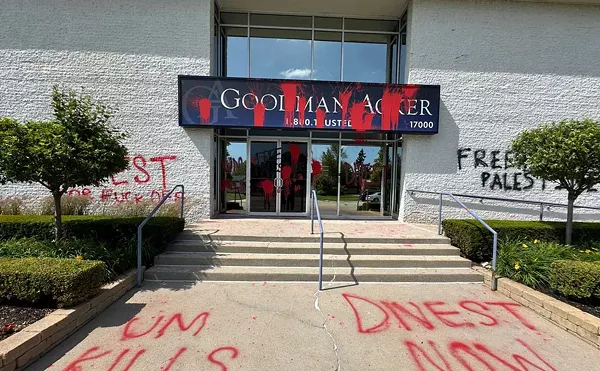
Audio By Carbonatix
[
{
"name": "GPT - Leaderboard - Inline - Content",
"component": "35519556",
"insertPoint": "5th",
"startingPoint": "3",
"requiredCountToDisplay": "3",
"maxInsertions": 100,
"adList": [
{
"adPreset": "LeaderboardInline"
}
]
}
]
For those of you who might’ve missed it, Metro Times reported late last month that the city is facing a massive layoff this year because of an ever-increasing deficit (“Detroit faces massive layoffs in 2005,” Metro Times, Dec. 22, 2004). On Monday afternoon, City Council Director of Fiscal Analysis, Irvin Corley, reported to council that Detroit’s financial situation is worse than anyone thought. Corley said the city is facing a deficit of at least $274 million and as high as more than $400 million.
“It is with great pain that I give you this report,” said Corley, his voice seeming to break. Among his suggested cuts: the firing of 2,340 workers and elimination of some city departments including transportation (yes, the buses), as well as big cuts to the recreation and police departments.
Corley reiterated the repeated sentiment of Council President Maryann Mahaffey that the Kilpatrick administration has not provided the data needed for council to make informed decisions on the issue.
Meaty, nuts-and-bolts solutions to the problem — which could lead Detroit into a state or federal takeover if the budget isn’t balanced — weren’t immediately discussed by the governing body, but the council provided ample finger-pointing as well as some worthy examples of outside-the-box thinking. Way outside.
Here’s a sample of how our fearless leaders publicly addressed Detroit’s hair-raising financial crisis:
• “It seems to me beer can’t be left alone,” Alberta Tinsley-Tilabi said. “The excise tax on beer hasn’t been raised since 1967. I just can’t believe that, with the cost of everything in the city going up. It seems like something there can be done.”
• Addressing council members and the director of the Southeast Michigan Council of Governments, Paul Tait, who came before council to deliver info on Detroit’s tax status, Councilman Lonnie Bates offered this analysis: “Detroit is a black city. People have never gotten over that blacks control the city and City Council. New York has a white mayor. Chicago has a white mayor. There’s a black mayor here. People in the papers try to write that things were different 20, 30 years ago, when they lived here. Things changed, we all changed. In the South in the ’60s, I couldn’t go to the restroom in the restaurants. We were down South. This is up South. This is a deeply rooted racist city and area.”
And here’s our all-time favorite line ever spoken by a politician in a public forum: “The reporting in this town is the asshole of America.”
With the subject of “white people” implied, Bates said, looking sometimes at Tait, “They want us to do what they want us to do. It’s not going to work like that.”
Bates added that, if a black man is an athlete “you’ll love us. You’ll even give your children, your daughters to us. But other than that, they don’t care nothing for us.”
• Sheila Cockrel, who is white, pointed out in response that most of the recent migration out of the city is by middle- and upper-class African-Americans. “We have to make the case to young African-Americans that moving here makes economic sense.”
• “What about the fair trade issue?” asked JoAnn Watson. “Ninety-five percent of Detroit’s consumer dollars are spent outside of the city. If the United States as a nation had 95 percent of its consumer dollars going outside of the country, the citizens wouldn’t stand for it.”
• “I think it should be the federal government’s responsibility,” Barbara-Rose Collins said. “The United States, we’re trying to make Iraq livable. Maybe the federal government should devise a plan to make Detroit livable.”
Collins suggested Detroit look at Grosse Pointe, which has no industry but is thriving. “I bet they don’t pay the 4 percent we do every time we flush the toilet,” Collins said, referring to the utility taxes in Detroit.
• Councilman Kenneth Cockrel says it would be a good idea to look at the reversal of the requirement for city employees to live in Detroit. Collins says that particular action by the Michigan Legislature “may be worth a suit in the Supreme Court as an assault on the city. It’s really an assault, like an enemy assault. That might be worth taking to court.”
News Hits is edited by Curt Guyette. Contact this column at 313-202-8004 or NewsHits@metrotimes.com




